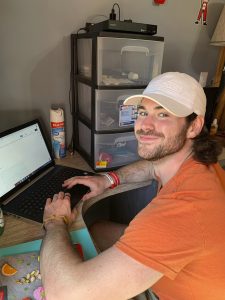This summer Austin Hughes and I worked as interns on a planning grant project for the Wabash Heartland Innovation Network (WHIN), a 10-county region in west-central Indiana. We worked under the direction of Dr. Sara Drury and in partnership with Chris Hutchinson and Kara Kavensky from Eleven-Fifty Coding Academy (EFA) to map the technology needs in the WHIN region and how they might be addressed for workforce development. EFA is a nonprofit coding academy based out of Indianapolis, whose services include affordable computer science and coding education programs. Our internship, which began June 8, was focused on building connections with local industry leaders and seeking their insight on the current state of technology in the area and in the workforce. In order to do this, Austin and I researched and constructed an industrial overview of the region. Once this was complete, our team took advantage of our pre-existing connections in the area to establish a network of industry and community leaders. In order to collect data from our participants, we first introduced ourselves and our project through emails to the major employers in Montgomery county. This was made possible with the help of Cassie Hagan, the current Director of the Montgomery County Chamber of Commerce, and Cheryl Morphew, an economic development consultant for the city of Crawfordsville, whose influence and access helped open the door for our project. Once the introductions were made, our team requested time for an interview with each of the businesses and asked for them to take a brief survey detailing their perspective on technology and technology training in their workforce. In order to increase our survey participation, Austin and myself learned to how to frame emails and cold-call employers to incentivize their response to the survey or agreement to an interview. Throughout this process, we learned to keep and organize data as well as how to construct reports. Additionally, we discovered a lot about public outreach and the fine line between being a salesman and a researcher. With the pervasive impact of COVID-19, our team worked together entirely through Zoom and email. This posed certain challenges with communication, among other things, and required that we be flexible and innovative in our approaches. This experience not only taught me a lot about the processes of grant-funded research and the necessary organization involved in this work but it challenged me to be productive in an environment which is not conducive to productivity. I found new ways to motivate myself and how to balance my time between two jobs. While I still have a lot of work to do with self-motivation and time management, this experience lent its hand to significant professional development for which I am abundantly thankful.
301 W. Wabash Avenue
Crawfordsville, IN 47933
(765) 361-6100
Copyright © 2024
